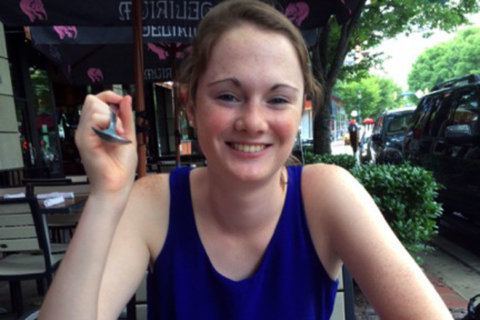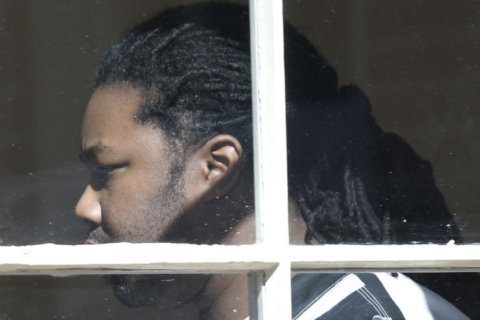WASHINGTON — Despite extensive media coverage of the search and arrest of Jesse Matthew for the September 2014 kidnap and murder of University of Virginia student Hannah Graham, very little is known about the prosecution’s case against Matthew.
New details will likely be revealed Monday, in a day-long pretrial motions hearing, in which 14 witnesses have been subpoenaed to testify.
Matthew was arrested Sept. 24, 2014 in Galveston, Texas, 11 days after Graham, a UVA sophomore from Alexandria, Virginia, was last seen on Charlottesville’s downtown mall. Police said Matthew was the last person seen with Graham.
See WTOP.com’s extensive coverage of the Hannah Graham story and the trial of Jesse Matthew
In the months since Matthew’s arrest and eventual indictment for capital murder, prosecutors and the defense have gone to great pains to guard details of evidence gathered by investigators.
Police believe Matthew met Graham, while she was walking in downtown Charlottesville, after an evening of drinking. Surveillance video from 1:08 a.m. Sunday, Sept. 13 depicted Matthew and Graham walking together, minutes after he first observed her walking alone.
The prosecution has not telegraphed its theories on why Matthew allegedly targeted Graham.
Matthew’s capital defender Douglas Ramseur and Charlottesville attorney Michael Hemenway have only recently asked for, and been granted, funds to hire a mental health expert. In December 2015, Matthew’s lawyers hired clinical and forensic psychologist William Stejskal to assist in their defense.
Both sides asked Albemarle County Circuit Court Judge Cheryl Higgins to seal search warrants that were sought in pursuit of Matthew, as well as the affidavits which detail why police were seeking the warrants.
Typically, those records become part of an open court file, which allows interested parties — including reporters — insight to the prosecution’s evidence and potential witnesses.
Albemarle County Commonwealth’s Attorney Denise Lunsford had argued for the records to be sealed, fearing reporters would seek interviews with the witnesses. The defense and judge agreed with her concerns.
Charlottesville defense lawyer David Heilberg, who is not involved in Matthew’s trials, says “both sides probably want a trial, if it occurs, in Albemarle County.”
Heilberg was part of the defense team representing Beltway sniper John Allen Muhammad, who was executed in 2009, for his role in the 2002 rampage in Virginia, Maryland, and Washington, D.C.
“Sealing this information is done to prevent publicity about case facts until trial,” says Heilberg.
In November, Lunsford lost her bid for re-election to formal federal prosecutor Robert Tracci, after securing indictments against Matthew for Graham’s murder, as well as the 2009 murder of Virginia Tech student Morgan Harrington.
Tracci, who has never prosecuted a state murder trial, has not indicated whether he will personally try the case, or assign it to an assistant commonwealth’s attorney.
Some details of the search warrants and the potential witnesses will become public Monday, when discussed in open court.
Ramseur has stated in court the defense will question the admissibility of items searched via the search warrants, since Higgins, who is hearing the case, signed-off on most of the warrants.
Little is known about any forensic evidence linking Matthew to Graham’s disappearance and murder, in particular whether Graham’s DNA was found in Matthew’s 1997 burnt orange Chrysler Coupe, which was seized Sept. 19, 2014, while Graham was still missing.
Graham’s remains were discovered Oct. 18, 2014, behind an empty home on Old Lynchburg Road, in a remote area of southern Albemarle County, a few miles from where Harrington’s remains had been found in 2010.
Other warrants have sought Matthew’s phone records, which could provide insight into his conversations and locations on the evening Graham vanished. Graham’s iPhone was never recovered, but data from cell tower records can show her general location on that evening.
Documents were recovered in relation to Graham’s Facebook, Snapchat, Skype, and Twitter accounts, as well as email.
In addition, the cell records of an unidentified third person were recovered through a warrant.
Matthew will go on trial for Graham’s murder July 5, 2016. If convicted, he could face the death penalty.
His first degree murder trial for Harrington’s murder — with a maximum penalty of life in prison — is set for Oct. 24, 2016.
Matthew was sentenced in Oct. 2015 to three life sentences for the rape and attempted murder of a woman in Fairfax in 2005.







